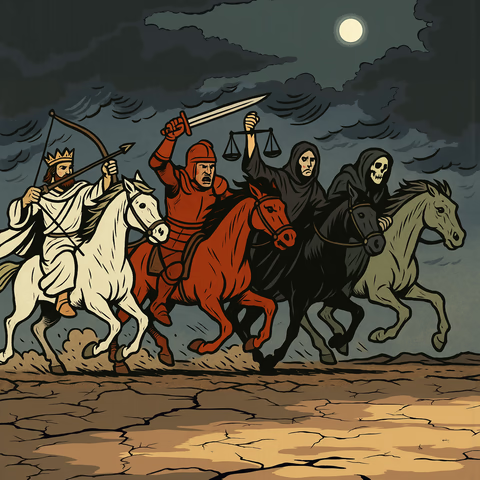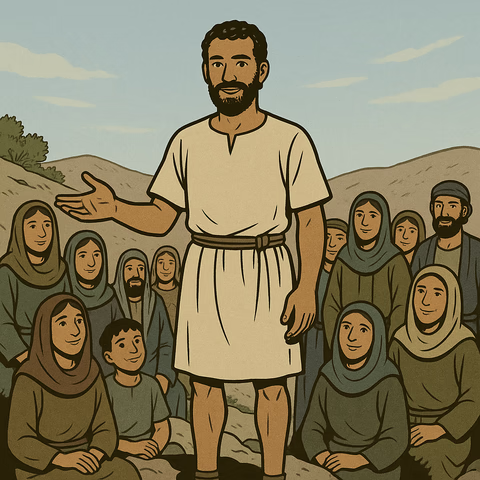
Quotes in the New Testament
The Christian Bible writers quoted earlier Bible texts (as well as other sources) many times. If we look up these references to see how they match up, we some interesting facts emerge.
For example:
- The vast majority of Old Testament quotes match up to the Greek Septuagint — not the Bible texts that most Christians use today.
- Most quotes that don’t match up with any source are just paraphrases or summaries; it’s not that the author got them wrong, they were just rewording things for brevity or to make a point.
- A very small number of quotes reveal some interesting problems (with fascinating solutions).
In this series of articles, we list all the quotes as they appear in our translation, and compare them to how they appear in the various original sources. For Old Testament quotes, that means:
- The Greek Septuagint (translated by us from Swete’s Septuagint)
- The Hebrew Masoretic Text (from the 1917 JPS Tanakh)
- The Dead Sea Scrolls (from dssenglishbible.com / World English Bible)
We discuss each quote, talking about how they match up, why they sometimes differ, and how the Hebrew text we have today has obvious differences to the Bible that Jesus, the Apostles, and other ancient Jews knew and read.
Quotes Index
- Matthew (27)
- Mark (13)
- Luke (16)
- John (11)
- Acts (34)
- Romans (62)
- 1 Corinthians (17)
- 2 Corinthians (11)
- Galatians (11)
- Ephesians (3)
- Philippians (1)
- Colossians (0)
- 1 Thessalonians (0)
- 2 Thessalonians (0)
- 1 Timothy (1)
- 2 Timothy (2)
- Titus (1)
- Philemon (0)
- Hebrews (30)
- James (4)
- 1 Peter (10)
- 2 Peter (4)
- 1 John (0)
- 2 John (0)
- 3 John (0)
- Jude (1)
- Revelation (7)
How many quotes are there in the New Testament?
In our reckoning, there are 266 quotes, with 261 of them being of the Old Testament.
However, it depends how you count them, so others may give you a different number. There are often blurred lines between quotes, paraphrases, and allusions or references. Is something a quote or just a reference that happens to use some similar words? It’s often hard to decide.
We count all direct quotes and paraphrases, usually (but not always) following what’s traditionally considered a quote.
Which sources match up best?
Out of 261 Old Testament quotes, 183 match both sources equally:
- The Greek Septuagint
- The Hebrew Masoretic Text
And many of these also match the surviving fragments of the Dead Sea Scrolls.
In 56 cases, the quote best matches the Greek Septuagint:
We’ve been very careful to only count these if they contain different details or different thoughts, not just rewording or paraphrase — but actual differences. These cases are explained either due to the Septuagint being translated interpretatively, Hebrew scribes cherry-picking from different variants, the Hebrew Masoretic Text suffering later corruption in the medieval period, or possibly even deliberate tampering to discredit Christians. Which is which is hard to say.
In 8 cases, the quote best matches the Hebrew Masoretic Text (Matt 2:15, 8:17, 13:35, 26:31; Mark 14:27; John 19:36; Rom 9:17, 11:35):
However, most of those that don’t match with the Septuagint appear to be simply the Greek translators working in a freer, less literal style. It suggests the Apostles were familiar with both the Septuagint and the Hebrew text.
Of the remaining 15 quotes:
- 7 quotes match both the Masoretic Text and the Dead Sea Scrolls very well, but not the Septuagint (Jo 15:25; Jo 19:37; Rom 9:33, 11:8; 1 Cor 14:21; 2 Cor 4:13; Rev 3:7). Again, these may be mostly due to a more free translation style rather than mistakes.
- 3 quotes don’t exactly match any of our sources very well (1 Cor 15:55; Jas 4:5; Rom 10:7). However, these may suggest now-lost versions of the original, or they just be extreme paraphrasing or quoting a now-lost midrash.
- 2 quotes match both the Septuagint and the Dead Sea Scrolls very well, but not the Masoretic Text (Heb 1:6; Rom 9:26). These suggest that either the Hebrew suffered some corruption in these places in later centuries (accidental or deliberate), or the Masoretic is based on a now-lost variant.
- 1 quote matches both the Septuagint and Masoretic Text very well, but not the Dead Sea Scrolls (Rom 3:13). This shows that some texts already had different versions circulating.
- 1 quote best matches the Aramaic Peshitta Old Testament (Eph 4:8), but not the other sources. However, admittedly, one could view this as matching the Septuagint and Masoretic Text with some explanation.
Also:
- There is 1 place where the New Testament quotes itself. It’s 2 Peter 1:17, which is quoting Matthew 17:5.
What does this tell us?
It tells us four important things:
- For us today, the Greek Septuagint is closest to whatever texts Jesus and the Apostles used. Nothing else available to us is as close.
- The Hebrew text we have today (dating to the 10th or 11th centries AD) is not the same as the Hebrew text that Jesus, the Apostles, and other ancient Jews knew and read. There is a theory that some texts were deliberately changed by 1st-2nd century Pharisees to discredit Christians. However, this may not explain all differences.
- When reading and writing in Greek, the Apostles were probably using the Septuagint, although it was likely an older and more faithful version than the version that’s survived to today (which is from the 4th century AD).
- When reading and writing in Aramaic, they were likely using some now-lost Hebrew or Aramaic Bible that usually agreed with the Septuagint.
And what about the Greek poets?
In addition to Old Testament quotes, there are 4 quotes of Greek poets (Acts 17:28; Acts 17:28; 1 Corinthians 15:33; Titus 1:12). Where sources survive, they all match.
Quotes Index
- Matthew (27)
- Mark (13)
- Luke (16)
- John (11)
- Acts (34)
- Romans (62)
- 1 Corinthians (17)
- 2 Corinthians (11)
- Galatians (11)
- Ephesians (3)
- Philippians (1)
- Colossians (0)
- 1 Thessalonians (0)
- 2 Thessalonians (0)
- 1 Timothy (1)
- 2 Timothy (2)
- Titus (1)
- Philemon (0)
- Hebrews (30)
- James (4)
- 1 Peter (10)
- 2 Peter (4)
- 1 John (0)
- 2 John (0)
- 3 John (0)
- Jude (1)
- Revelation (7)
Catalogs
 Bible Study and Translation Resources
Bible Study and Translation Resources Differences in the Codex Sinaiticus of Revelation
Differences in the Codex Sinaiticus of Revelation Quotes in the New Testament
Quotes in the New Testament The Messianic Prophecies
The Messianic Prophecies
Also see our Articles index and our About section.